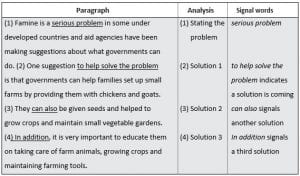Use different organisational patterns
Based on the topic sentence, you need to develop each paragraph using a clear organisational pattern. Remember each paragraph must support your thesis. Some common organisational patterns are discussed below.
Exemplification
You would commonly use exemplification in academic writing to illustrate your ideas in an essay. See the analysis of the following paragraph for its information organisation and the signal words (see underlined phrases) used to indicate exemplification.
Some other signal words and phrases you can use to represent exemplification are especially, particularly, notably, chiefly, mainly, to illustrate and that is.
Cause-effect
In your academic essays, you are bound to write about actions and events. These are generally discussed in the context of their causes and results. You can see this organisa- tional pattern and the accompanying signal words used to indicate cause and effect in the analysis below.
Some other signal words and phrases associated with this pattern of organisation are due to, because of, as a consequence of, effect of, resulted from, was the result of, consequently, therefore, thus, accordingly and resulted in.
Problem-solution
The problem-solution pattern of organisation is a very common pattern in academic writing as you will frequently be focusing on an issue and ways of solving its problems. You can see this pattern in the following paragraph.
Comparison-contrast
Another pattern you can use to develop your paragraphs is the comparison-contrast pattern. In this pattern of organisation, you will explain the similarities and/or differences between two items. In the example below, the differences are highlighted.
A paragraph of comparison can be similarly organised. However, the signal words and phrases would be different. Listed below are other signal words and phrases associated with both comparison and contrast patterns of organisation.
Comparison: just as, both, not only…but also, similarly, likewise, also, as, like and too
Contrast: although, even though, though, but, yet, despite, in spite of, nevertheless, on the contrary, on the one hand, on the other hand, in contrast, whereas, while, instead, still and otherwise
As well as a paragraph, a whole essay can be developed using one, or combining several, of the patterns of organisation explained in this section, depending on the key words in your question or prompt.




